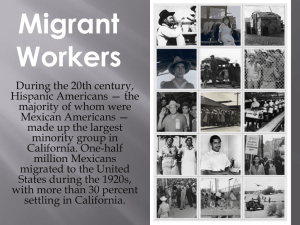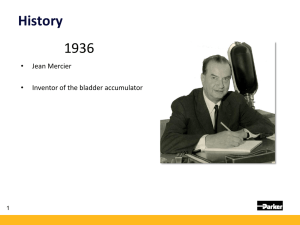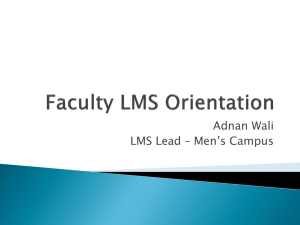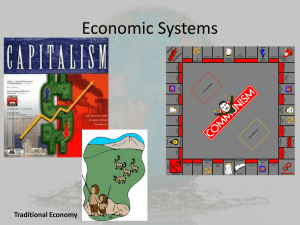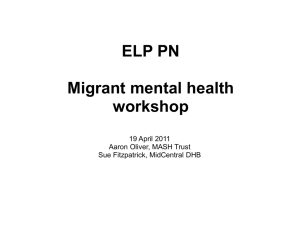Russian- and Turkish-speaking migrant communities in Sweden
advertisement
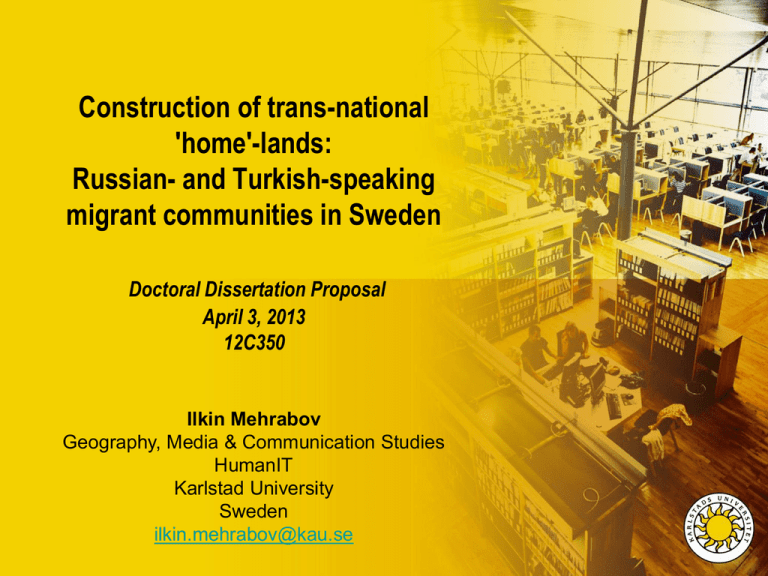
Construction of trans-national 'home'-lands: Russian- and Turkish-speaking migrant communities in Sweden Doctoral Dissertation Proposal April 3, 2013 12C350 Ilkin Mehrabov Geography, Media & Communication Studies HumanIT Karlstad University Sweden ilkin.mehrabov@kau.se This dissertation proposal for doctoral research in ICT4D - information and communication technologies for development - within the scope of media and communication studies arose from the combination of three intersecting realizations: - Contemporary Sweden is host to a relatively large - and rapidly increasing number of migrants with various backgrounds. - There exists a limited volume of research on migrants within the scope of media and communication studies. - There is even lesser focus on their media and communication usage within the context of everyday life and in their domestic environments. Ilkin Mehrabov, GMK, HumanIT, KAU ilkin.mehrabov@kau.se Construction of trans-national 'home'-lands: Russian- and Turkish-speaking migrant communities in Sweden Setting the Research Problem: In its broadest sense 'development' can be defined as "changing the world for the better", where this change starts at the "bottom rather than the top" (Peet & Hartwick, 2009, p. 2). It is important to shift the focus of ICT4D studies to include developed country contexts as well, since, especially within the Scandinavian context, "[s]ignificant socio-economic inequalities between natives and immigrants are manifest", which results in "[e]thnic minorities’ higher unemployment rates and greater degrees of social welfare dependency" (Hagelund, 2008, p. 74). Ilkin Mehrabov, GMK, HumanIT, KAU ilkin.mehrabov@kau.se Construction of trans-national 'home'-lands: Russian- and Turkish-speaking migrant communities in Sweden This study will engage into the widening of notion of ICT4D by looking at the practices of ICT usage by transnational migrant populations within the Western countries by focusing on Sweden, developed country which recently ranked the first place in the Web Index's 2012 rankings. Dissertation will investigate how the environment of multiple communication, information and media technologies, including both the newly emerged "polymedia", that is the "plethora of internet- and mobile phone-based platforms such as email, instant messaging (IM), social networking sites (SNS) and webcam via voice over internet protocol (VOIP)" (Madianou & Miller, 2012, p. 1), as well as older transnational communication technologies such as satellite TV, function in migrants' lives, and what sort of social changes occur due to the ever-increasing processes of transnationalism and mediatization. Ilkin Mehrabov, GMK, HumanIT, KAU ilkin.mehrabov@kau.se Construction of trans-national 'home'-lands: Russian- and Turkish-speaking migrant communities in Sweden Forming the Research Questions: 1. What roles do various ICTs and media play within the everyday life of transnational migrants? 2. In what ways does the usage of various ICTs and media contribute to the process of identity construction and the formations of an ontological sense of 'feeling at home' and a material sense of 'being at home'? 3. In what ways do geographic origin and current spatial environment, taken together with variations in socio-historical backgrounds, play into 'home'-making practices? Ilkin Mehrabov, GMK, HumanIT, KAU ilkin.mehrabov@kau.se Construction of trans-national 'home'-lands: Russian- and Turkish-speaking migrant communities in Sweden Reaching the Research Goals: This dissertation aims to contribute to the discourses of ICT4D by widening its scope, and adding more epistemological sense to the word 'development' used within the abbreviation by putting the emphasis on social change. As an overall goal, the study aims to further scrutinize the potential and limitations of mediated communicative environments for individual development, as well as communal empowerment of transnational migrants. The focus remains on practices and sense of 'feeling at home'. Ilkin Mehrabov, GMK, HumanIT, KAU ilkin.mehrabov@kau.se Construction of trans-national 'home'-lands: Russian- and Turkish-speaking migrant communities in Sweden Double-layered comparative analysis of Turkish- and Russian-speaking transnational migrant communities living in two distinctive city forms, Stockholm, a global city and capital of Sweden, and Karlstad, relatively small provincial city located in Värmland, and their usage of ICTs and media technologies within their everyday life will help in producing an illuminating and complex panorama of the Sweden's social cohesion. Ilkin Mehrabov, GMK, HumanIT, KAU ilkin.mehrabov@kau.se Construction of trans-national 'home'-lands: Russian- and Turkish-speaking migrant communities in Sweden THEORY The intention to reformulate the way migrant media usage and consumption is studied requires a new framework to operate with when looking at migration processes within the contemporary media-saturated society. In our proposal we propose a new analytical-theoretical structure to study migration and insist on integration of three tropes into triangulation of such attempt. The pillars of this study will be a theoretical triangle embodying three fundamental concepts: Ilkin Mehrabov, GMK, HumanIT, KAU ilkin.mehrabov@kau.se Construction of trans-national 'home'-lands: Russian- and Turkish-speaking migrant communities in Sweden THEORY a) identity, especially as expressed in Stuart Hall's terms of constant becoming instead of fixed belonging; b) transnationalism, especially in relation to the theoretical conceptualization of Steven Vertovec and his emphasis on super-diversity c) mediatization, a "historical, ongoing, long-term process in which more and more media emerge and are institutionalized" (2009, p. 24), as in the definition provided by Friedrich Krotz. Ilkin Mehrabov, GMK, HumanIT, KAU ilkin.mehrabov@kau.se Construction of trans-national 'home'-lands: Russian- and Turkish-speaking migrant communities in Sweden Theoretical model for analytical framework. Ilkin Mehrabov, GMK, HumanIT, KAU ilkin.mehrabov@kau.se Construction of trans-national 'home'-lands: Russian- and Turkish-speaking migrant communities in Sweden Identity: Stuart Hall's definition of identity seems to be much more plausible to integrate in our study, that in their purest form, "[t]hough they seem to invoke an origin in a historical past with which they continue to correspond, actually identities are about questions of using the resources of history, language and culture in the process of becoming rather than being: not 'who we are' or 'where we came from', so much as what we might become, how we have been represented and how that bears on how we might represent ourselves" (Hall, 1996, p. 4). Ilkin Mehrabov, GMK, HumanIT, KAU ilkin.mehrabov@kau.se Construction of trans-national 'home'-lands: Russian- and Turkish-speaking migrant communities in Sweden Transnationalism: Transnationalism, "economic, social and political linkages between people, places and institutions crossing nation-state borders and spanning the world" (Vertovec, 2009, p. 1), was developed as a reaction to two concepts at once. First of all, as the globalization was going on in the whole world and number of publications and statements applauding it were increasing, transnationalism developed a novel way of looking at ordinary people and their migration patterns and thus was even labeled as the 'globalization from below' (Vertovec & Cohen, 1999). The second, and more important reaction, was against the methodological nationalism, long prevailing paradigm within migration studies which looks at migrants only within a frame of nation-states, without taking into consideration cross-border character of many migrant conditions. Ilkin Mehrabov, GMK, HumanIT, KAU ilkin.mehrabov@kau.se Construction of trans-national 'home'-lands: Russian- and Turkish-speaking migrant communities in Sweden Mediatization: In our study we are using definition provided by Friedrich Krotz, who defines mediatization as a "historical, ongoing, long-term process in which more and more media emerge and are institutionalized", and continues by saying that it actually describes the "process whereby communication refers to media and uses media so that media in the long run increasingly become relevant for the social construction of everyday life, society, and culture as a whole" (2009, p. 24). Ilkin Mehrabov, GMK, HumanIT, KAU ilkin.mehrabov@kau.se Construction of trans-national 'home'-lands: Russian- and Turkish-speaking migrant communities in Sweden METHODOLOGY: As a result of three research questions and focus on Russian- and Turkishspeaking transnational migrant communities living in Karlstad and Stockholm I will have 4 datasets of people/geographies categories involved in my fieldwork, that is: -Russian-speakers residing in Karlstad -Turkish-speakers residing in Karlstad -Russian-speakers residing in Stockholm -Turkish-speakers residing in Stockholm Ilkin Mehrabov, GMK, HumanIT, KAU ilkin.mehrabov@kau.se Construction of trans-national 'home'-lands: Russian- and Turkish-speaking migrant communities in Sweden My data will be obtained from 1. Interviews: 10 per category – 40 in total 2. Focus groups: 1 per category – 4 in total 3. Non-participant observations While selecting initial sample units for my interviews and focus groups I will use the method known as convenience sampling, that is I will start with studying people, who are most easily available for me, through people who I'm already acquainted with, and from there I will start snowballing for further recruitment of interviewees. Ilkin Mehrabov, GMK, HumanIT, KAU ilkin.mehrabov@kau.se Construction of trans-national 'home'-lands: Russian- and Turkish-speaking migrant communities in Sweden



